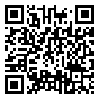BibTeX | RIS | EndNote | Medlars | ProCite | Reference Manager | RefWorks
Send citation to:
URL: http://ismj.bpums.ac.ir/article-1-543-en.html
2- Deptartment of Pharmacology and Toxicology, Faculty of Pharmacy and Toxicology Research Center, Ahvaz Jundishapur University of Medical sciences, Ahvaz, IRAN ,
3- Deptartment of Pharmacognosy, Faculty of Pharmacy and Medicinal Plants, Natural Products Research Center, Ahvaz Jundishapur University of Medical sciences, Ahvaz, IRAN
4- Deptartment of Microbiology, Faculty of Medicine, Ahvaz Jundishapur University of Medical Scineces, Ahvaz, IRAN.
Background: pyrrolizidine alkaloids have been isolated from Echium amuenum. These alkaloids knowing as hepatotoxic, damage the liver. Mutagenicity of pure pyrrolizidine alkaloids has been identified. Thus, the mutagenic effect of the methanolic flower extract was tested using Amest test. Materials and Methods: The long maceration process (for 48 hrs) is carried out in order to extract all constitutes. Thin layer chromatography (TLC) method was used to evaluate aflatoxin B1 contamination and histidine amino acid presence. Minimum inhibitory concentration (MIC) was determined with the dilution method. Salmonella typhimurium strain TA100 was used to determination of mutagenicity. The genotype was confirmed by using histidine requirement, R- factor presence, rfa and uvrB mutations tests. The mutagenicity assay was performed by four extract concentrations (0.25, 0.5, 0.75 and 1mg/ml). Sodium azide (NaN3) and methanol were used as the mutagens (positive control) and negative control, respectively in the absence or presence of liver-metabolizing enzymes. Results: The data indicate that Echium amuenum has not significant mutagenic activity against negative control. The presence of liver-metabolizing enzymes did not exhibit a significant change against the properties of extract. Conclusion: It seems that this extensive used plant in traditional medicine, doesn’t contain mutagenic or genotoxic effect in usual doses.
Received: 2012/08/10 | Accepted: 2012/10/13 | Published: 2014/06/14
| Rights and Permissions | |
 |
This work is licensed under a Creative Commons Attribution-NonCommercial 4.0 International License. |





